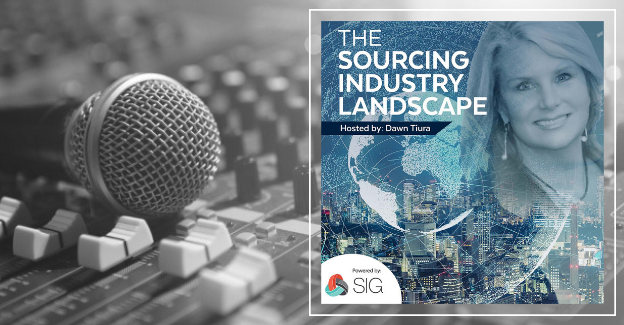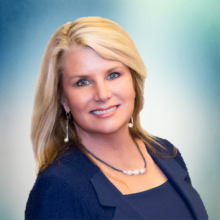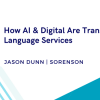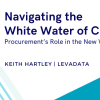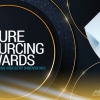Dawn Tiura: Hi everybody. I'm gonna introduce you to Debbie Manos-McHenry. You probably all know of her, she is from Huntington Bank. Debbie has been nominated as a Sourcing Star. It's not a surprise to anyone that Debbie made this list. Her nomination is full of all the wonderful things that she does. So I wanna welcome you to the show, Debbie.
Debbie Manos-Mc: Thank you. Good afternoon.
Dawn Tiura: Well, tell me a little bit about your career and what got you where you are today.
Debbie Manos-Mc: I am at Huntington National Bank, and I'm the Chief Sourcing Officer, I'll go backwards. I've been here for almost nine years since the very tail end of 2009. Prior to that, I was at KeyBank for 20 years. Half of that time was in the procurement re-engineering initiative, which ultimately grew into a consolidation of 15 state banks into one national bank, old JIAC AP systems into Oracle ERP, and ultimately procure to pay with Ariba. I became Director of Technology and Operations, and ultimately succeeded that Chief Sourcing Officer in that role. Prior to that, for 10 years at KeyBank, I was the Assistant Tax Director, and backup before that, was the Tax Manager and the Akron Office of KPMG Peat Marwick.
Dawn Tiura: That's why I love you so much. You're another nerd like me.
Debbie Manos-Mc: Yes, I am.
Dawn Tiura: You know, Debbie, you are known as a mentor, as somebody that when you present, you give such amazing advice. You talk with two feet on the ground, but you look at the world from 40,000 feet. Just tell us about some of your accomplishments.
Debbie Manos-Mc: I think probably the biggest accomplishment here, within a very resource constrained financial services industry that went through the crisis in 2008 and '09 and has been investing significantly in applications that are gonna impact our customers. For an operational area, we really do have to be lean. The rest of the bank, the revenue segments really rely on the Operations and Technology Group to get more efficient year over year, keep the operating leverage within our long-term targets, which means that we don't have a significant amount of money to invest on technology. Lean people, lean technology and being able to sustain year-over-year savings and the 15 to 25 million range, which would be seven to 12% of everything we touch, or three to 5% of our total source-able spend. With limited resources and limited technology, I think it's a huge accomplishment.
Dawn Tiura: That is amazing. If you were to talk to someone just starting out, what kind of advice would you give them? Maybe something you wish you could have taught your younger self or something that you've learned the hard way along the way.
Debbie Manos-Mc: I think finding a way to invest in technology very early on would be a requirement, depending upon where you come from. I came in as chief sourcing officer, so I had the opportunity to say, "Here's my roadmap. These are the tools that I need." In that first year, I was able to implement e-sourcing, and the company had already made a business case for spending analytics. Being able to issue our fees electronically and analyze spend that's reconciled and comes from an IP—that's absolutely paramount. That's the table stakes. I think in any reorganization or transformation that I've heard over the years from multiple CPOs—make decisions quickly. Don't retain team members who are unable to make that evolution into strategic sourcing versus transaction-based processing. Don't elongate that pain, it's not worth it for either party. And staff up quickly.
Debbie Manos-Mc: Keep them engaged. That goes into what I'm talking about in terms of efficiency. We've done the same number of deals. In 2010, we did 250 contracts as a team with 12 and a half people. We grew over 11 to 17, utilizing Denali Sourcing Services, a staff augmentation to about 20, and I'm at 21 today. We're doing 795 contracts.
Dawn Tiura: Wow, that is a lot. Oh my gosh. So, obviously, technology is going to impact your future and the future of sourcing in your opinion.
Debbie Manos-Mc: Yes, absolutely.
Dawn Tiura: Can you expand on that? Where do you see additional impact coming?
Debbie Manos-Mc: The efficiency. So eliminating, creating a controlled environment through procure-to-pay technologies to, say, business segments, here's where you're going to buy. We've recently implemented Coupa Procure-To-Pay, so businesses are currently invoicing, everything through Coupa. Ultimately, we're gonna say anything over $1000 requires a PL. Well, I'm not staffed to deal with that. We need to establish category strategies and use the technology to invoke that. With the assistance of buyers to direct business segment colleagues for that long tail into an arena where they can buy; so, pre-vetted suppliers in an actionable arena and Amazon-like experience. That's paramount.
Debbie Manos-Mc: The other thing is the SIG's sourcing accelerator has a number of different companies that are doing some really cool things with contracting to kind of sniff out your contracts and do the OCR text recognition to find specific provisions in an agreement, and tie that to the vendor master, so you can see a 360 view of your spend, and the contract, and any other ancillary data you've collected on that contract. That's huge right at your fingertips. That's the kind of efficiency this team needs to be able to make very quick decisions.
Dawn Tiura: I love the fact that after 22 years at one company nine at another, you still are passionate about technology, and you don't run from it. You embrace it. What is your inspiration to keep it fresh all the time?
Debbie Manos-Mc: I'm a data geek at heart. I love being able to get that data quickly, and you can't do that on spreadsheets. It has to be reliable, consistent data. So being able to just go into Ariba’s spend, for instance, and pull up what I've spent over the past four years. We had a summer intern, and I learned something from her this year, how to use a slicer and a pivot table. I'm an adopter of pivot, having started out with Lotus 1-2-3, and Symphony, and then using database programs, and now an avid pivot table user. We dumped all this massive data for the entire year into the spreadsheet and created the slicers so that the sourcing manager team could really pull up these two spreadsheets side by side on our very wonderful big monitors here at our new facility.
Debbie Manos-Mc: On the left hand side, they have a slicer of our top spend. On the right hand, the contracts coming up for renewal. It's powerful because all the data they need to do their segment planning for this year, it's right at their fingertips. They don't need to go pull the data. It's done. It's just powerful stuff, and it produces consistent quality graphics and pinpoints decision-making conversations for the business segment.
Dawn Tiura: I think because you are as a data geek, as you call yourself, the fact that you really delve into it. Every time you tell a story it’s a complete story. It's a teaching moment for people that are listening, and I love that. It's not pie in the sky. Like I said, feet on the ground but from 40,000 foot level, you're looking at and how to be more strategic all the time. I'm not at all surprised you were nominated. You have some fabulous company in this category. I just am wishing you the best of luck as we get closer to the awards in October. I hope you are working on your acceptance speech.
Debbie Manos-Mc: Well, thank you. This is exciting, and I'm honored to be nominated.
Dawn Tiura: Well, it is an honor to have you as part of the SIG family. Debbie, I can't thank you enough for all the areas that you throw yourself into. You've never said no to any request for help. You've mentored people internally, externally, so I'm a big Debbie Manos-McHenry fan as you know.
Debbie Manos-Mc: Well, thank you. I'm a big Dawn fan as well.
Dawn Tiura: So folks, this is Debbie Manos-McHenry. She is up for the Future of Sourcing Awards, and she is a sourcing star nominee finalist for our award ceremony. I wanna thank you, Debbie, for your time today.
Debbie Manos-Mc: Thank you. Bye.
Dawn Tiura: Thanks. That was Debbie Manos-McHenry from Huntington Bank. Our next Sourcing Star finalists is Jennifer Shepherd from Russell Investments. Jennifer is a Director of Global Sourcing and Procurement at Russell's Investments. Jennifer is a Sourcing Star finalist. Jennifer, welcome to the podcast.
Jennifer Shepherd: Thank you.
Dawn Tiura: I'm so excited to have you here. Now I have in a very impressive write-up about why you were named as a Sourcing Star, and it has to do with a transformative project that you did in telecom that actually ultimately became an article and CIO Magazine and has been shared widely. Do you wanna share a little bit about why you were nominated?
Jennifer Shepherd: Sure. That is actually one of my favorite projects. The reason being is that, not being an IT professional and I have done IT procurement, but we can't always be as knowledgeable in the space as our stakeholders. We, in procurement, recognize opportunity where some of our teleconference services were getting extremely pricey. We noticed that people were using expensive teleconference lines just to call one another across the floor. We had an alternative that had no incremental cost whatsoever. When I had mentioned it to our head of IT, there were some reasons why the IT felt like the alternative solution couldn't actually be used. Rather than just accept that as an answer and let it go, I continue to push on and test, and talk to suppliers, and get information to prove that actually wasn't true and this was a viable alternative.
Jennifer Shepherd: Then I was able to move forward. It was about a two-year initiative where we passed policy. We use senior executives to sponsor us in the project. We were able to cut out almost a million dollars in teleconference spend by moving to this solution. Now, what makes me so incredibly happy is every time I get on a teleconference call with anybody here at Russell Investments, they're on the alternate solution. I feel like that was a really large success that is a little different from your typical sourcing project because it involved a lot of transformation, and policy-making, and training of the people that work here, et cetera.
Dawn Tiura: But that goes around the globe. I mean, you had to roll out a policy and manage the change management around the globe, right?
Jennifer Shepherd: Yes. So we went in phases and country-by-country. In some countries, in particular, there were IT difficulties where this new technology didn't work. It was a matter of really going out, figuring out what was going on, driving the IT stakeholders to figure out what was going on, make fixes to the IT infrastructure. At the end of the day, now, even IT is on board with endorsing this other solution, so it was a success.
Dawn Tiura: That's amazing. Tell me, where does your inspiration come from, for you to do something. Obviously, you had an adversarial IT department. You saw a need that could be fixed, result in 90% savings. What inspires you to go after something like this?
Jennifer Shepherd: I just feel like it's the right thing to do. In the past, I've not necessarily had a good leadership that supports me, and sponsors me, and stands behind me to push these kinds of initiatives. I feel like I really have that now in the leadership that I have. I have a boss who would also not take no for an answer. I just feel like it was the right thing to do, and I couldn't stand by and based on some potentially incorrect information, just let that falter.
Dawn Tiura: Well, I think that's remarkable. If you had advice for someone else starting out in the industry, what kind of advice would you give them?
Jennifer Shepherd: I would say think outside the box because, even here at Russell Investments, I drafted a sourcing-and-procurement playbook that goes step by step. Here's what you do, here's the considerations, here's the requirements, et cetera, et cetera. Yes, we have to do all those things. Yes, there are boxes to check and there are processes to follow, but sometimes those aren't the best way to do things. Sometimes there's a better way to do it. You have to question and you have to be a detective. You have to learn to ask the right questions and not take no for an answer. I would say, starting out new. Always have that in mind so that if you do come across a stakeholder that says, "Well, you know what. I don't wanna look at this," or, "This can't really be done right now." You push it a little bit further. Don't take no for an answer. Just keep moving, and know that the simple answer, the one that they give you, may not always be the right one.
Dawn Tiura: Oh, that's absolutely true. So, obviously, technology came into play for this, but do you see technology impacting you in the future in additional ways?
Jennifer Shepherd: Absolutely, in a couple different ways. First, you know, we have technology, we have tools that we use just in this field. There's different tools out there that can help make our lives easier. Over time, those tools simply get better and better and better; so contract management system, and tools to do—make the collaboration a little bit easier. That's huge. That said, when you're owned by a private equity like we are, there's not always the funding for those tools anyway. They're not necessarily imperative to doing the job. I think where technology it comes into play is just in our role as procurement over IT, and understanding what's going on in the landscape. Understanding that our IT partners may not always have the vision. Yes, they're experts in the space, but I think we need to also be experts in the space as much as we can.
Jennifer Shepherd: For example, the projects that we worked on around choosing a data center, we didn't know here sitting in procurement the first thing about what goes on in a data center, but we knew that may be what IT had in mind. They may have been missing the boat on looking around and trying to figure out what the best way to set up that infrastructure would be. We had to take some extra steps to train ourselves up. That was going out to suppliers, going out to get expert advice from our peers on, "What did you do when you were looking at data centers?" I think that because the data center technology is so different than it was even five years ago, and we can't really advise our clients, meaning the internal stakeholders, if we don't, ourselves, know what the options are. In that way, I think it's important that we stay on top of what's going on in the technology landscape.
Dawn Tiura: Well, it also sounds like you have an insatiable curiosity, and you wanna continue to learn.
Jennifer Shepherd: That's true. I would say that's probably true. I mean, that keeps you from being bored in the job I feel like if you're just doing the same thing day in and day out—and there are people who like to do that—I'm just not one of those people.
Dawn Tiura: Well, which is probably the reason you were nominated as a Sourcing Star for exactly that reason as a finalist. I love the story that you tell. Can you just tell me briefly, how did you get into this industry—or the sourcing industry?
Jennifer Shepherd: It's quite by mistake, actually. I always joke and say nobody wakes up in the morning and says, "I'm going to be a sourcing professional," because most people don't even know what it is or that it exists. I had just gotten out of law school. I had an incredible love for the law when I was an undergrad. I decided to go ahead and do a part-time JD program. At the time I got out of law school, it was the economy had tanked and there weren't a lot of jobs out there. I did not wanna really go to a law firm and work 80 hours a week and be an intern and bring people coffee, because I had already been a working professional for 10 years. It wasn't about to step back into that role. I called my school and I said, "Hey, look, I've been in the banking industry for 10 years. Who do you know at Washington Mutual, because they were local here in Seattle at the time, who could help me maybe getting in?"
Jennifer Shepherd: They hooked me up with somebody who was actually in sourcing and procurement. Not the legal group, but somebody in sourcing and procurement. Actually, that group had a bunch of attorneys that did contract negotiations and contract work. I got in there and started on the contract arm and doing more contracting. Then as my career advanced, I did less and less of the contracting stuff, and more and more of the typical sourcing and procurement stuff. It was just quite coincidental that I fell into it, but here it is, what, 12 years later and I love it. I love what I do.
Dawn Tiura: Oh, that's awesome. I can tell you've got some passion about the industry. I can just hear it in your voice. It's been so nice, Jennifer, hearing from you. I know you're a frequent presenter at the SIG conferences and I really appreciate all the thought leadership you bring to bear every time you present.
Jennifer Shepherd: Thank you so much. I appreciate it, Dawn.
Dawn Tiura: I wish you the best of luck as we get to the finalists' selection. I can't wait to see perhaps you on stage receiving an award.
Jennifer Shepherd: Yes. Okay, thank you.
Dawn Tiura: I look forward to that. Thank you so much. Folks, that was Jennifer Shepherd, Director of Global Sourcing and Procurement at Russell Investments, a Sourcing Star finalist. I'm sure we're gonna hear a lot more about this woman in the years to come. That was Jennifer Shepherd from Russell Investments. Up next is Kate Vitasek of University of Tennessee. Folks, with me today is someone who probably needs little to no introduction. I have Kate Vitasek, who's not only an amazing author and faculty at University of Tennessee, but she's one of our Sourcing Star finalists. Kate had more nominations for this category than anyone else. I'm so pleased to welcome you to the podcast today, Kate.
Kate Vitasek: Well, thanks. I'm glad to be here and share a little bit about our work.
Dawn Tiura: Good, then this is the chance. I mean everybody knows your name; but to be a Sourcing Star finalist, you really have to have a huge reputation. Tell me some of the reasons you think you were nominated.
Kate Vitasek: Well, I'm guessing it's for a work at the University of Tennessee around Vested outsourcing and particular sourcing business models. We set out, and I really, I say we so you can't... It's just who I am, but we had a team that set out to go and study how people bought really strategic things. If you look at… PNG has 80,000 suppliers. What are the most strategic things they would buy? When you start to look at that, what we found was that a lot of people were using the same tools or best practices in their toolkit. We wanted to challenge that and really say that you needed a best-fit approach instead of a best-practice approach. Through our research, we developed what was called sourcing business model theory. In particular, the Vested business model, where we've got six books on the concept. I'm really excited that the concepts that we've set out 15 years ago, 18 years ago, to create, have taken hold in the industry. I mean, how cool is that? As a professor, you sit there, and you get to go study things, but when people do them, that's cool.
Dawn Tiura: Not only do they do them, companies around the world come to you for advice. I mean it not only has it stuck, it has grown. It’s quoted and, obviously, we love it enough that it's integral piece to our certified sourcing professional training. I'd say people are listening to you and implementing it.
Kate Vitasek: Well, that's the best honor that anyone could ever have. Then, on top of that, to be nominated for a Sourcing Star finalist, that's super cool. What a good day.
Dawn Tiura: Then, after this, we are going to be talking about your team finalists, but let's stay away from that one right now. You know so much about the industry. If you met someone new, who's starting out in this space, what kind of advice would you give them? Or what could they avoid doing to get over some bad stuff and get right into the good stuff?
Kate Vitasek: I always start every one of my classes out with a quote from Albert Einstein, so I can't contribute this to me, but really, Albert Einstein says, "The significant problems we face cannot be solved with the same level of thinking we're at when we created them." I challenge all of my students and anyone who calls me to think about what they're doing, and is it taking them to the right place that they wanna be? Because, often, you get stuck in rituals, dogmas, existing practices, and it's holding you back because we're not bringing an open mind and creative thinking. The business today is different than it was 10, 15, 20 years ago. Sadly, so many procurement books are still teaching concepts from the 1980s and 1990s. We have to challenge the dogmas and old ways every day that we're a practitioner. What is the way to do things today?
Dawn Tiura: That's gonna change again tomorrow.
Kate Vitasek: It absolutely will, because the world is evolving. It is not the same business. Our latest book, the last one, and the one that SIG uses in your courses is called “Strategic Sourcing In The New Economy.” Today's world is different than it was in the past. 10 years from now, I'm gonna have to revamp that because, as you said, even tomorrow, it's gonna be different.
Dawn Tiura: So tell me, what got you into this industry? Obviously, you're a faculty, but now you are a sourcing expert worldwide. What got you into sourcing?
Kate Vitasek: Sometimes the best things just happen because they just happen. My background actually is in supply chain management and not particularly in sourcing. Although, supply chain is a big discipline and sourcing is a component of that. Early on in my career, I work for, at the time, Andersen Consulting, now Accenture, in their logistics and supply chain strategy practice. We began to look at a lot of cross-industry type work, cross company, so particularly buyer, supplier, outsourcing large, outsourcing complex deals. It just happened to be the work that I had fallen into as part of my projects at Andersen Consulting at the time. Then I went to work at Microsoft where I led a large initiative to do some outsourcing practices. Outsourcing has to do with sourcing and that's just the place that might my career took me. I never set out to be that way. It's just those were the jobs that I had, and they were fun, and it stuck.
Dawn Tiura: That's the part that's so amazing is that not only, you didn't just fall into it, you had a passion for it once you fell into it. You've really changed the world. Tell me about this. How do you think technology is going to impact the future of sourcing?
Kate Vitasek: Gosh, it will absolutely impact it. It already has, right, because I always say PNG has 80,000 suppliers, right? How are you gonna spend the time and energy on all of those suppliers? You can't. What I like is marrying up technology with sourcing business model theory because the technology is an enabler to help you get the right system with each type of sourcing business model. If you're at the lower end of the continuum, the sourcing business model continuum, basic approve suppliers, that should all just be automated. We've had a technology for how many years now, Dawn, to automate the lower end, the basic stuff we buy. That should just be standard going forward. It's fun seeing that technology evolve to make that easier. In the old days, you had to spend a gazillion dollars to automate procurement.
Kate Vitasek: Now, there's platforms that are enabling that and really taking it down to where, even small businesses, can have and use technology. Also, technology is an enabler of the upper end, right, some of the automated dashboards. We're studying in these very complex, global outsourcing-type deals, how they're using analytics. Artificial intelligence analytics and dashboarding—super cool work that technology is enabling in the analytics on the upfront, the high-end side. I think it's gonna impact every single sourcing business model you've got out there. Again, it's not gonna be about a best practice, it's gonna be about a best fit for the type of deal that you're doing.
Dawn Tiura: Oh, I can't agree more. I was going to ask what's next for you, but I think that needs to be the next book is how does technology marry to the sourcing models.
Kate Vitasek: That would be an interesting one, for sure. Actually, I hadn't really thought about that. We're actually writing one now on relational contracts, because a lot of people will come to us and say, "Gosh, Kate. I love the concept of Vested in some of these more strategic relationships, but my lawyers hate them. They wanna use the standard terms and conditions, the standard contract templates." It's like squeezing a square peg in a round hole. I'm teaming with a couple of attorneys, actually, to write a book targeted to attorneys about sourcing. Maybe they'll be something interesting there. The next one will have to be about technology.
Dawn Tiura: Okay, then I'll wait and help you on that one. How's that?
Kate Vitasek: Awesome. Good deal. I'm all in.
Dawn Tiura: I love that. Folks, I'm talking to Kate Vitasek, faculty at University of Tennessee and a Sourcing Star finalist, of course. I just wanna wish you the best of luck at the awards. I also wanna thank you for being a judge on some of the other awards as well. We really appreciate all your contributions to the industry, Kate. You're amazing.
Kate Vitasek: Well, thanks. I'm excited to go and meet all the other Sourcing Stars. I know some of them, but I don't know them all. It's gonna be fun to have all that brain power in one spot. How cool is that?
Dawn Tiura: I know, I know. I've been loving these podcasts. I've gotten to know some folks I didn't know before, the Rising Stars and the Sourcing Stars. It's been a lot of fun. It's gonna be a mind-blowing few days together in October.


